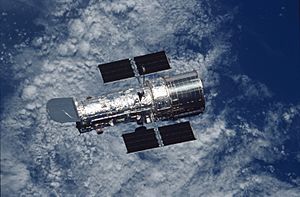Astronautics facts for kids
Astronautics is the science and practice of traveling beyond Earth's atmosphere into outer space. It's also called cosmonautics. Spaceflight is a big part of astronautics, and it's all connected to the larger field of space science.
The word astronautics comes from French, first used in the 1920s by J.-H. Rosny. It's similar to aeronautics, which is about flying in Earth's atmosphere. Because these two fields are connected, the word aerospace is often used to describe both. In 1930, Robert Esnault-Pelterie wrote the first book about this new area of study.
The word cosmonautics was also introduced in the 1930s by Ary Sternfeld. His book, Introduction to Cosmonautics, even won an award!
Space travel is very challenging. Spacecraft must survive extreme conditions like a strong vacuum (no air), lots of radiation from space, and powerful forces during launch. Satellites can also experience huge temperature changes very quickly. Engineers who design spacecraft always try to make them as light as possible. This helps them carry more useful equipment, called the payload, into orbit.
History of Space Travel
The idea of space travel started with theories and math. Isaac Newton laid down the basic rules for how things move in space in 1687. Other mathematicians like Leonhard Euler and Joseph Louis Lagrange also added important ideas in the 1700s and 1800s.
Even though the math was there, actually traveling to space didn't happen until the mid-1900s. Before that, writers like Jules Verne and H. G. Wells imagined spaceflight in their stories.
At the start of the 20th century, Konstantin Tsiolkovsky from Russia figured out the "rocket equation." This important equation helps calculate how fast a rocket can go based on its fuel and weight.
By the early 1920s, Robert H. Goddard in the United States was developing liquid-propellant rockets. These types of rockets became very important for famous rockets like the V-2 and the huge Saturn V.
An award called the Prix d'Astronautique (Astronautics Prize) was created in France in 1929. It was given to people who studied interplanetary travel and astronautics.
By the mid-1950s, the "Space Race" began. This was a competition between the USSR (now Russia) and the United States to see who could achieve more in space.
What Astronautics Engineers Study
Even though astronautics is a special field, engineers and scientists in this area need to know about many different subjects.
Astrodynamics: How Things Move in Space
This is the study of how objects move in orbit. People who specialize in this field look at things like how spacecraft travel, the path of rockets (ballistics), and how planets and moons move (celestial mechanics).
Spacecraft Propulsion: How to Move in Space
This area focuses on how spacecraft change their orbits and how they are launched into space. Most spacecraft use some kind of rocket engine. So, a lot of research goes into different types of rocket propulsion, like chemical, nuclear, or electric engines.
Spacecraft Design: Building Spacecraft
This is a special type of systems engineering. It's about putting all the necessary parts together to build a launch vehicle (like a rocket) or a satellite.
Controls: Guiding Spacecraft
This field is about keeping a satellite or rocket in its correct orbit and pointing in the right direction. This includes attitude control, which means controlling the way a spacecraft is oriented in space.
Space Environment: What Space is Like
While this is more about physics, understanding the effects of space weather and other environmental issues is very important for spacecraft designers. It helps them build spacecraft that can survive in space.
Bioastronautics: Life in Space
This field studies how living things, especially humans, are affected by space travel.
Other Related Fields
- Aeronautics and aerospace (flying in air and space)
- Mechanical engineering (designing and building machines)
- Physics (the study of matter and energy)
See also
 In Spanish: Astronáutica para niños
In Spanish: Astronáutica para niños
- Atmospheric reentry
- Frank Malina
- French space program
- Hermann Oberth
- Sergei Korolev
- Wernher von Braun
 | Georgia Louise Harris Brown |
 | Julian Abele |
 | Norma Merrick Sklarek |
 | William Sidney Pittman |


